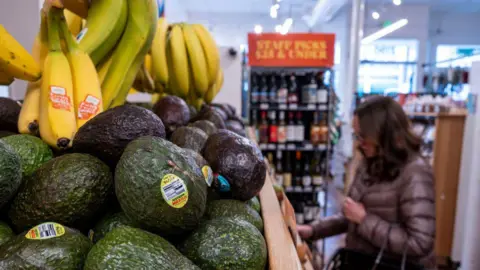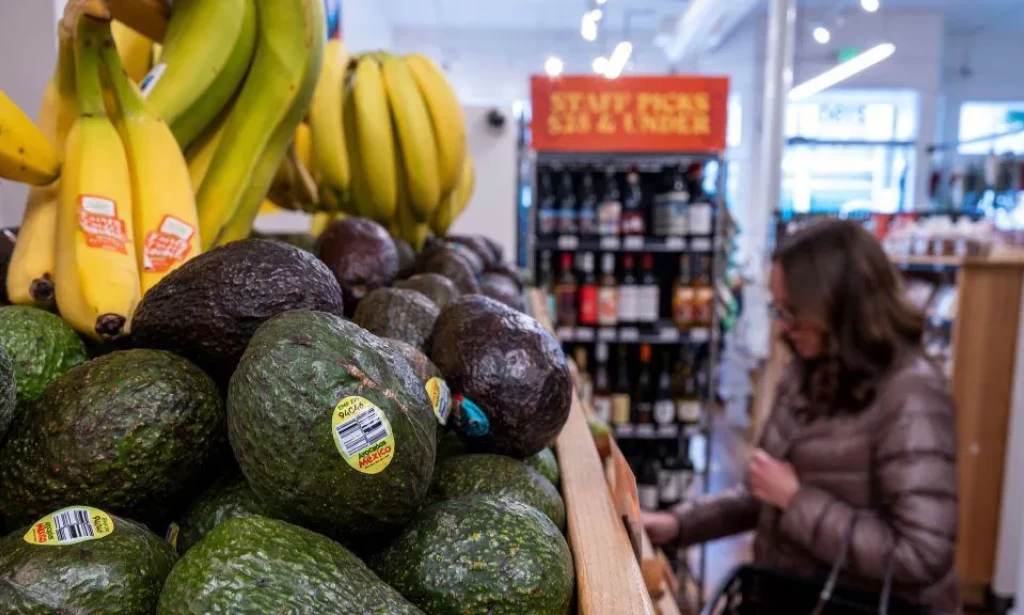 Bloomberg via Getty Images
Bloomberg via Getty Images
When President Donald Trump last week removed tariffs on more than 200 products, it represented something of a political earthquake, and marked a significant concession on a hallmark White House policy
The decision, which critics said was long overdue, came as the president returned his attention to cost-of-living issues, after polls suggested affordability concerns were weighing down White House approval ratings and hurting Republican candidates in recent elections.
A top lobby group for the food industry, FMI, the Food Industry Association, hailed the tariff rollback, which affected popular items like bananas and coffee, as a "critical step" toward affordability, as other business groups also praised the move.
But in the end, the practical relief may not feel as monumental as the political gesture.
In October, the Budget Lab at Yale projected that Trump's tariffs this year - currently a baseline tax of 10% on imports from all countries, with additional levies on many trading partners - would drive up food prices 1.9% in the short run.
The impact would be significant, given that US grocery prices historically have been relatively stable, rising an average of only 2% a year between 2013 and 2021.
The White House order did not eliminate tariffs on all food, but it removed levies on some items, such as coffee, spices and tropical fruit like bananas, for which US production is negligible or non-existent.
For those kinds of goods, economists and businesses said they expected the order would help bring down prices - and relatively quickly.
Trump rolls back tariffs on dozens of food products
Anthony Serafino, president of the New Jersey-based fruit importer and distributor EXP Group, said he expected to drop his prices in the coming weeks, after raising them earlier this year to cover millions of dollars in new tariff costs.
He said it might take a few weeks for shoppers to see the difference, since he has to sell items he brought in before the change. But he expected the decision to be a "big help".
"We were just passing through costs. We're not going to keep prices elevated just to keep prices elevated," he said.
The overall impact on household grocery budgets, however, may still end up feeling relatively modest.
Though the US is heavily dependent on foreign supplies in certain categories, such as fresh fruit and seafood, imports typically account for less than 20% of overall food and beverage purchases by Americans, according to USDA.
And many food imports from Mexico - America's single biggest foreign food supplier - were already spared tariffs, due to White House exemptions for goods covered by a US, Mexico and Canada free trade agreement.
"You will certainly see it on certain products," said Sean Cash, a professor of food economics at Tufts University. "I don't think we're going to see a lot in terms of the average price of groceries coming down."
Food companies are still facing higher costs from tariffs on materials like aluminium, used to make canned foods; items like wine, cheese and palm oil did not make the list.
Recent jumps in food prices also reflect factors unrelated to tariffs, like rising labour costs and droughts, which hit coffee and cattle supplies.
"If we got rid of trade barriers on food items and food commodities, would that make food cheaper in the US? Yes, a little bit, but not that much, because most of what we're buying are services," said Daniel Sumner, a professor of agricultural economics at the University of California, Davis, noting costs like border inspections, washing, trucking fees and supermarket workers.
Overall, grocery prices climbed 2.7% over the 12 months to September.
That is still significantly lower than the huge jumps in 2022 and 2023, when grocery prices surged 11.4% and 5% respectively.
Trump administration officials have cast high food prices as a mess they inherited from the Biden administration, and warned it will take time to correct the problem.
In a briefing for reporters last week about new tariff exemptions, they acknowledged the effects might be limited, saying reducing prices in grocery aisles was the goal and not a guarantee.
Walmart, Target and Kroger did not respond to requests for comment.
Food prices tend to fluctuate more than other kinds of goods, meaning some relief is likely, especially given attention on the issue, economists said.
But Sylvain Charlebois, director of the Agri-Food Analytics Lab at Dalhousie University in Canada, warned today's high prices are likely to inform future decisions, comparing the dynamic to the "tide".
"The tide goes up, it leaves a mark on the dock and that line remains," he said. "If tariffs disappear, you will see that mental mark remaining and industry tends to work with that mark."



You must be logged in to post a comment.